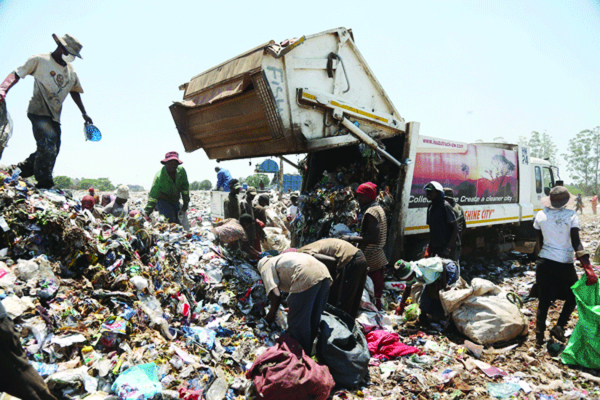
WITH four children to fend for, Tendai Gwishiri (47) has to be innovative in order to earn a living against the backdrop of an economy that has proved to be very unkind, with many falling into abject poverty, as there are very little employment opportunities.
BY TINOTENDA MUNYUKWI
His is a fascinating tale of a man who, nine years ago, was forced to migrate to Harare in search of opportunities after losing his job as a bartender in Murewa. After having toiled day and night in search of formal jobs with no luck, Gwishiri was encouraged by a friend to venture into a rare waste recycling business, with the main focus being plastic papers and containers.
A NewsDay crew recently visited Gwishiri at his workstation — which is an open ditch in Mbare — where he was sorting and selecting plastics that included bags and empty drink bottles.
“If there was any other way, I would have been employed formally, as is any other person’s aspirations. But look, this is what is there and this is my only option, which I have embraced since 2009, making a living out of recycling plastics,” he said.
Although people, who see Gwishiri scrounging garbage dumpsites can easily mistake him for a hobo, for him, this is a job like any other. He defies the ever-present threat of contracting disease, as he rakes through heaps of waste, sorting through unimaginable trash without any protective clothing in search of plastic “treasures”.
“I get the material I want from Pomona and also some other dumpsites which are around the city. I know there is the risk of contracting diseases and all, but I am a father, who has school going children, therefore, this is my only way out,” Gwishiri said.
“The best I have tried to do is to acquire knowledge on some of the plastics that are known to contain harmful substances, especially from industrial areas, so that I can avoid them.”
- Chamisa under fire over US$120K donation
- Mavhunga puts DeMbare into Chibuku quarterfinals
- Pension funds bet on Cabora Bassa oilfields
- Councils defy govt fire tender directive
Keep Reading
The plastic material that Gwishiri collects, once he sorts through it, is sold mainly to Chinese buyers for a paltry 35 to 45 cents per kilogramme, and the buyers go on to melt it and make newer plastic bags, cups and dishes among other plastic ware products.
Sometimes the Chinese buyers visit Gwishiri’s workstation in search of the plastics because the recycling trade keeps attracting many people in the capital, competition has grown, necessitating the need to take wares to the Chinese industrial shops instead of waiting for the traditional visits.
“I make between $250 and $300 every month after selling these empty plastic containers for between 35 and 50 cents a kilogramme depending on how we bargain, because you know this business has been attracting a lot of new players of late and, therefore, it has become so hard to manage the competition,” Gwishiri said.
In Mbare alone, there are about four sites where people are intensively recycling and selling plastic as a primary means of survival, and such is the traction that the business has gained, that even companies like Waverly Plastics are buying recycled waste to use for their businesses.
On a national scale, recycling of waste has been on an upward trend with the tonnage of recycled municipal waste trebling from 18 tonnes in 2012 to 66 tonnes in 2015, and plastic forms a significant part of these quantities according to the Zimbabwe Water and Waste Statistics Report of 2016.
The work being undertaken by Gwishiri, apart from earning a livelihood for him, is also helping to conserve environmental sustainability, which requires that the maximum amount of waste be recycled, reused or processed without creating any environmental hazards.
If left at the dumpsites, the plastics eventually turn into an environmental hazard because the material used to manufacture most of these products is polyethylene, which does not decompose easily.
The sprawling plastic recycling business In Harare is also cutting across the gender divide, by empowering women, who are plying the trade to be self-dependant and fend for their families.
“I am a mother of two and I have been in this business for five years now. We came all the way from Churumhanzu with my husband to start this business, and we have been paying our children’s school fees through this,” Rudo Chisiri, a 41-year-old woman recycling plastics in Mbare, said .
However, as the business trends continue to shift, with the recyclers now having to approach the buyers, there is now need to meet transport costs to carry the bulky plastics to prospective buyers.
“These days, we are encountering challenges, including increased costs because the transport to carry all these things to the potential Chinese buyers is killing us. I think we need to be formally recognised by the government and get all the support we need because we are not only doing good for the environment, but we are also doing good for the country. I understand some of these plastics are being exported and this is bringing foreign currency into the country,” added Chisiri.
Many of the Chinese to whom they sell the plastics are making a killing, as they attract huge numbers of mainly women that come to buy plastic buckets, dishes and plates among other plastic wares mainly at the Graniteside industrial area.











